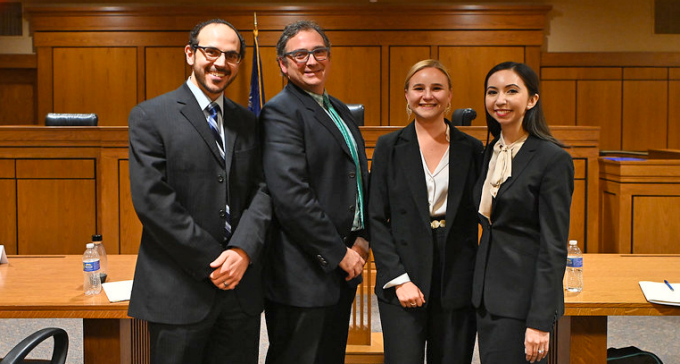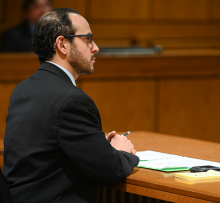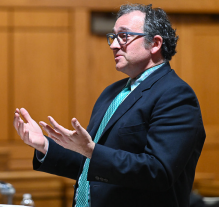
Competition finalists Mathew Biondolillo '24, Matthew Mitchell '24, Miriam Trojanovic '23 and Kristen Crow '23.
Mathew Biondolillo ’24 and Matthew Mitchell ’24 prevail in this year's Desmond Competition
The 2022 Charles S. Desmond Moot Court Competition returned to O’Brian Hall. Though the Covid pandemic relegated the competition to Zoom for the past two years, this year’s event was live, with a full complement of 20 two-person intramural teams competing in UB School of Law’s prestigious appellate advocacy competition.
“The Desmond Competition is such an excellent opportunity for students to practice their appellate advocacy skills and we were so pleased to offer it to them in-person again,” says Carolyn Duttweiler ’23, president of the Buffalo Moot Court Board. “Although the return to in-person after two years of Zoom was certainly a challenge, we had a great team on the board this year whose tireless efforts made it a success.”
The competition typically draws its central problem from the U.S. Supreme Court docket, and this year was no exception. In their written briefs and oral arguments, students pleaded for the plaintiff and the respondent in a constitutional law case taken from recent headlines: A married couple who run a bakery, citing their religious beliefs, seek to deny service to a same-sex couple looking to purchase a wedding cake, in contravention of an Oregon public accommodation law that prohibits discrimination on the basis of sexual orientation.
It was a case that focused on First Amendment issues: the freedom to exercise one’s religion and the bakers’ right to free speech, arguably applicable because they considered their confections artistic creations.
The competition, held Oct. 27 to 29, culminated in a final set of oral arguments in the law school’s Francis M. Letro Courtroom. Acting as the federal bench were three volunteer judges: UB Law Dean Aviva Abramovsky; Professor Lucinda Finley, Frank G. Raichle Professor of Trial and Appellate Advocacy and director of appellate advocacy; and Assistant U.S. Attorney Sean Eldridge ’10, a member of the law school’s adjunct faculty.
The team of Matthew Mitchell ’24 and Mathew Biondolillo ’24 prevailed in the end, in a closely argued session with runners-up Miriam Trojanovic ’23 and Kristen Crow ’23.
“Honestly, I think it could have been a coin flip at the end,” Biondolillo says. “It was a grueling day.”
His partner points out that the teams argued off-brief about half the time but says that experience made for an intellectual challenge. “We had to read all the dissents in the previous cases, and it called on us to dig a little deeper,” Mitchell says. “It wasn't always the side a team might have chosen, but in the end, you're not arguing for yourself. On a practical note, I do see value in forcing yourself to argue through the opposite position, because you’re forced to re-evaluate your own argument. It was a good skill to have worked on.”

Mathew Biondolillo '24

Matthew Mitchell '24
For Biondolillo, “one of the biggest lessons was how deep an appellate attorney has to delve into the case to understand the arguments on a more reflexive or implicit level, to be able to respond to the type of questioning you receive. There were very difficult, complex questions. If I wasn’t totally comfortable with the law, I’d be trying to juggle too many things at once. But as the rounds went on, it got easier to inhabit the argument itself and have a better conversation.”
Other standouts from the competition include:
- Best brief: A tie between the team of Michael Arena ’23 and Nathan Zobrest ’23, and the team of Tyler Hogan ’24 and Ian Hoock ’24
- Best brief (Runner-up): Kelly Kulakowski ’24 and Tabitha Salonen ’23
- Best oralist: Elizabeth Hughes ’24
- Best oralist (Runner-up): Alex Blanco ’24